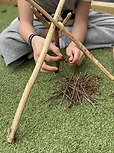

Play & Creative Therapy
Suitable children from 3 yrs+ - young people

Children and young people often find it easier and more natural to express themselves through the medium of play. Feelings, thoughts, experiences and interpretations of their own world, can be safely explored using the Play Therapy Tool Kit, without adult judgment, interpretation or expectation.
Play Therapy enables the children to explore, express and challenge difficult feelings and /or traumatic events, in an accepting space, where their autonomy is placed as priority by the Therapist.
Play Therapy enables a child to access their inner-world in a child-centred, unconscious and non-adult directive way.
A child's ability to be their own healer, with an appropriate and qualified therapist, holding their emotional space, is at the heart of Play Therapy ethos and ethics.
As the child's unique process evolves over a period of personal growth, the child may begin to navigate their difficulties (with the Therapist) through more directive experiences and modalities.
It is within this journey that the child begins to create their own change, and personal growth occurs.
As each child is unique, please take into consideration that there is no set amount of sessions that each child may benefit from. As an ethical frame of reference, I set a minimum of 12/24 sessions depending on the Childs needs. With additional sessions set in 6 session blocks. Reviews will be carried out at session 8, for us to discuss where your child is in their therapeutic process.
The best interest is always focused on the needs of the child and in gaining their informed consent before a contract is agreed.
Some reasons a child might benefit from Play Therapy may include, if they:
- are feeling anxious or stressed
- experience night terrors or sleep issues
- appear withdrawn, sad or lonely
- have difficulties with friendship groups
- have an EHC Plan or IEP - or are on the pathway
- express rage, aggressive erratic feelings
- bully or are bullied by others
- are at risk of being excluded from school
- are fostered, adopted, under a SGO or have a CIC plan
- find everyday experiences difficult to enjoy or overwhelming
- have experienced a traumatic event or episode
- have experienced a loss, separation, or a family break up
- display low self esteem or self harm
The Play Therapy Tool Kit consists of a range of therapeutic tools and resources, aimed to provide opportunities for the client to explore aspects of connection, expression, safety, stabilisation and regulation.
Resources include: sand, puppets, clay/dough, water, arts and crafts, games, musical instruments, small world and role play items, sensory items, books, stories and creative visualisation, dance and movement, Lego and construction, mindfulness practices ... this is not an exhaustive list.








My POD space for private practice
Situated in the town of Thrapston (NN14), my POD (Place Of Discovery) has been purpose build to accommodate clients (aged 4+) in a safe, private, child-friendly and fully equip space for play and creative therapy. It also hosts LEGO Therapy sessions and Group Therapy.
6 surprising facts about play & creative arts therapy
Perhaps you only just heard of Play Therapy or you’ve never quite understood why it’s beneficial for children who are struggling?
Here are quick 6 key surprising features of play & creative arts therapy that many don’t know about!
1. Play taps into the deep emotions.
Play is one of the deeply embedded motivational circuits (located in the brain stem and limbic system). We all love to learn through play. The play circuit lives deep in the brain in the same regions that process emotion and our non conscious responses such as breathing, heart rate and hormonal regulation. A child’s brain develops with the play drive as a top priority (which shows it’s importance for further development). Play therapists meet the child where they are at in terms of their emotional experience when it gets triggered through playful exploration. The therapist will co-regulate with the child and work creatively to make sense of their feelings using children's natural language, which is play of course! Through play, play therapists tap into the emotional life of the child by activating the same regions of the brain.
2. Play therapy changes the brain.
The brain is plastic and is moulded by our experiences. The brain is most plastic during childhood and the teenage years. Thankfully, with a skilful play therapist, the child’s brain can re-wire itself through the new positive experiences in the playroom. By keeping a consistent safe relationship and environment contained in the playroom, play therapists strengthen these new neural pathways in the brain. The child gets to experience the feeling of safety and connection and gains a sense of inner security. We first need to experience safety and security before we can tolerate uncertainty in the outside world and become resilient. Play therapy helps a child integrate implicit and explicit memory, the neo cortex and subcortical brain, the left hemisphere and right hemisphere along with many other areas. An integrated brain is key for mental wellness.
3. Play is instinctive and comes in many forms.
Painting, dancing, banging a drum, moulding clay, creating a story in a sand tray. These activities are all self generated and self rewarding. It's not about the outcome but about being in the moment. So sharing a story, using puppets, role playing in fancy dress, stomping in shaving foam, or even fiddling with a pen can all be included ! They all fall under play. Play is one of the primitive emotional circuits in our brain and it is essential for development.
4. Children learn from play but we do not directly teach.
A common misconception is that play & creative arts therapists teach their clients how to play better. Although there is a time and place for being directive, most of the time we are non-directive which means we let the child lead. We facilitate the child to learn about themselves and see their actions and emotions in a new light. Children choose and learn for themselves. As a therapist & in my personal life I've found the real lasting changes people make come from within rather than because someone told them to change.
Self awareness, problem solving, self-regulation, motor skill mastery, storytelling, empathy and self esteem are just some of the magnificent lessons that children can learn from play therapy.
5. Play therapy is all about the relationship.
The most crucial factor for effective therapy is the relationship between the child and therapist not the toys or the variety of play. The relationship can take some time to build depending on the child and circumstances. The feeling of safety is paramount for the child to dare to deeply explore their inner world. Play therapists are trained and experienced at building this sense of trust.
6. Play allows greater understanding and insight.
This applies directly to the child but also to the parent and family. You’ll see your child in a new light. Many parents tell me that after working with me they learn new things about their child. Plus they often reflect on their own childhoods. Parents enjoy reframing their child's behaviour after regular checkins with the therapist. A child who feels fully seen and understood will be more willing to be co-operative, empathetic to others, confident and resilient.
So how many did you already know about? Which one surprised you or which one had never occurred to you before?
Perhaps you knew them all already? Either way they are quite impressive for something that on the surface looks like just “mucking about” (That’s the favourite term from teen clients!)
Tell the world! Spread awareness of Play Therapy to schools, parents, medical & community centres. Too many children don’t have access to play therapy who truly need it.
Check out the play therapy register for UK registered play and creative arts therapists in your area.











